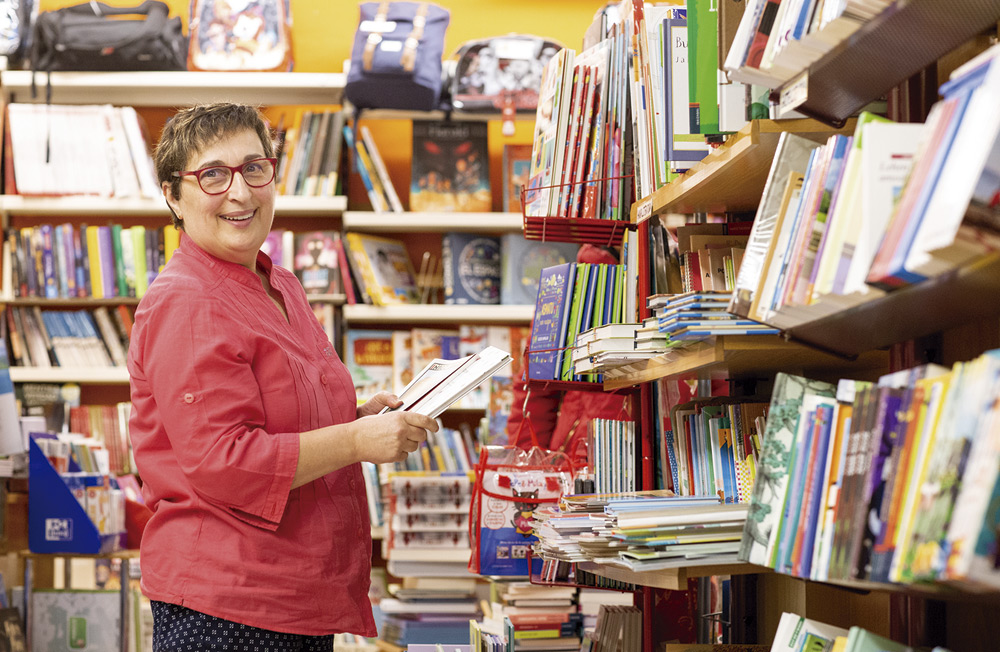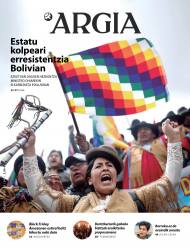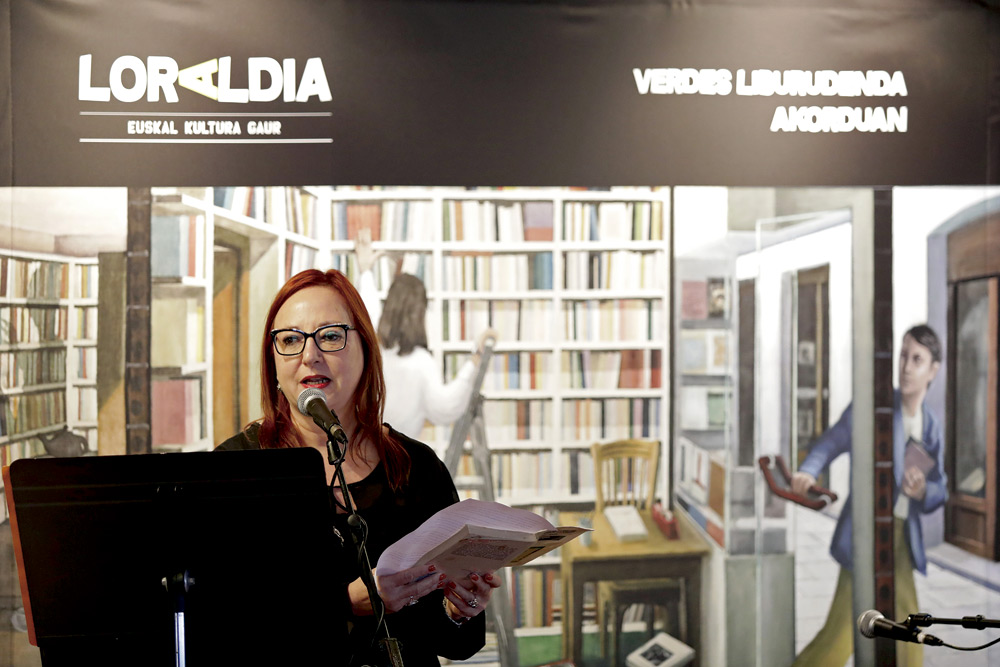"Because of the Durango effect, some good books go unnoticed."
- Among the booksellers in Pamplona, the Abarzuza family has a special place, since in 1944 Andrés Abarzuza opened its first store. Today, their grandchildren are still in the book business. One of them is Martzela, the most charming shop on the hill in Santo Domingo. Previously, books and magazines banned in Euskera were hidden. They are now hosting the most spectacular shelving in Abarzuza.

Iruñean sortu eta betidanik liburu-dendan aritu da amarekin. Hasieran Kale Berriko dendan, gero Xalbador eta Xalemen, eta duela 26 urtez geroztik Santo Domingo aldapako Abarzuza liburu-dendan. Abarzuza denda euskal kulturaren ezinbesteko erreferentea da Iruñean, familia honek orain dela 75 urte lehen denda zabaldu zuenetik.
Bookseller ever?
Yes. My first memories are from the store we had on New Street. I spent a lot of time there and also playing in San Francisco Square.
How did Abarzuza start selling books?
In 1944 my father, Víctor Abarzuza, asked for authorization to open a bookstore in Carnicerías Street, near the City Hall. He asked for it on his behalf, but it was his grandfather Andrés who started the business. His grandfather was the goalkeeper of the town hall and with the help of his children opened Abarzuza. Book Fair. When in 1952 the City Hall’s expansion works were carried out, the shops on this street were closed and moved to Calle Nueva.
How did your mother, Ceferina Fontellas, get to the store?
Our mother was of orphanage and was adopted by a family of Beunza. He was a very humble family and it was up to him to do everything: to make coal, to go with the cows… and at the age of 12 he came to Pamplona as a maid. As a young man, he worked at his grandfather's house and there he met my father. He immediately started helping him in the store and when his father died at the age of 45, he brought us forward to the five siblings, working in the store, sewing and doing everything he could.
Your innocent mother has stayed at the counter until the last hour. Smiling and always ready to speak in Basque.
Yes, it was. Although he was a born Basque and understood Spanish perfectly, he had much easier to speak in Basque, so he went to the bus station many times to see if he saw people from Beuntza or vasco-speakers from other towns to talk.
But you didn't learn Basque at home, didn't you?
No. I am the oldest in the family and when I was born my mother always spoke in Euskera with me, but my father, because of his poor health, used to be in the hospital many times and when he came home he was sad because when he heard us speak in Euskera she did not understand it. Therefore, the mother decided to do it in Spanish at home.
Since when are you on Santo Domingo Street?
We opened this store 26 years ago. I was in Kale Berri's store for many years. Then my husband Rafa and I were in the Xalbador and Xalem stores until we opened it. In addition, the mother lived on a second floor in Calle Mayor and as here they sold the tent and the first floor at a time, the three of us came here and accompanied us until he died four years ago. We've been very comfortable here.
And there's more Abarzuza in the book business, right?
Yes, they've had several stores. Currently, Kike and Maria premiums are present in the Iratxe store, formerly El Bibliofilo, and their specialty are the old books, and two others are Pablo and Patxo, Elkar.
Does the bookseller necessarily have to be passionate about the reader?
As a child, my siblings were very readable, but I wasn't. Although my mother was doing a lot of work, I didn't like anything until I was 16. I remember what book led me to change my mind. The cursed district of Felix Urabayen. I read it and I loved it. Since then I have not stopped reading. In my opinion, what I was missing until then was to understand, and that is precisely the problem of so many children and young people today. I am convinced that it is essential that everyone finds their own book to become fond of reading and that can happen at any time in life.

How is the business of selling books?
In recent years, the influence of new technologies and the drop in the sale of paper books has been noted. I am not against e-books, but against piracy, because that hurts us a lot.
However, I believe that paper books will not disappear and that there is still a place for us. Publishers are reinventing and increasingly publishing more attractive books: graphic novels, comics, illustrated books… they are very nice works. In the children's and youth literature there is still a powerful market, both in Basque and in Spanish, and the readers of the generation of my age are between paper and technology. We use technology, but we love paper. There is still a market, not as big as we would like, but yes. Just as fashion novels are increasingly read in digital format, local issues or for children and young people are sold more on paper. In any case, in order to continue as a bookstore, we have to sell more and more stationery material in order to survive. Booksellers, in general, not just us, are very romantic and we have a lot of titles, although maybe we only sell 10 percent of them.
In any case, I have to say that the Basque people are very loyal. There is still awareness of buying Basque books or subjects from them. That's why we need to thank our customers.
Is the Basque theme your specialty?
Yes and the issue of Navarra. We have the vast majority that is published.
Being in the heart of the lockdown, are there many tourists among the clients?
Yes, a lot. These require, for the most part, local history and guidelines. Among those who come from the Spanish state we sell customs very well, the legends of the Basque Country.
Are there best sellers in this field?
I often recommend the book Orhipean. Xamar published 26 years ago in four different languages. It is very good, because it shows you briefly what Euskal Herria is from many points of view and also with a lot of illustration. The graphic novel Illustrated History of the Basque Country by Joseba Asiron and Martin Altzueta Martintxo is also sold very well.
Does the Durango Trade Show bring book plume?
Yes. Lately, publishers are betting on that because it's a good showcase, but for us it's very difficult. I wanted to teach it all and I couldn't. It would be better for the work to be made public throughout the year. Because of the Durango effect, some good books go unnoticed. They highlight the best known authors in all the media and many of the new authors are in the background. They submit to each other and perceive themselves very well, literally, on the shelves.
If you're not Bernardo Atxaga, is it better to post it at any other time?
Yes, and if you're Atxaga doesn't matter when you get it out, at the Durango Fair or July 6. It doesn't matter because it's a secure success. However, the opinion of publishers should also be heard in this matter.
They gave you the bass drum of the rock Jarana in the Sanfermines last year. Satisfied?
It was very exciting because we saw how much people want us.

They stressed that the doors of Abarzuza are always open, even for the runners of the enclosures.
Runners have been coming in for some time to leave their stuff here before the lockdown begins. It is normal in us and it should be in all places, in my opinion. At five o'clock in the morning, we took a little thing out into the street to sell newspapers, but the store door is open and some corridors come in to leave things or go to the bathroom. It all started in a very natural way. I remember who the first one was. Father of the mountaineer Iñaki Ochoa of Olza. She was running here in Santo Domingo, like her son, and she once asked us for permission to leave the glasses here. That's how it all started. Then they started coming one after the other. Everyone leaves their cell phone, their wallet… wherever and until the day after the lockdown. The worst thing is that when he doesn't come to look for it, that means the bull may have caught him. Fortunately, it rarely happens.
The doors of our store are always open to everyone. The strength of the small shops is precisely the direct relationship we maintain with the people.
Is it cold to buy the book in the hypermarket?
I think so. Anyway, I think there are people who prefer that, because they don't dare to go into a small store, maybe because they're not going to buy anything. I understand, and that's why we're not going behind customers. The merchant should also be a psychologist and look at what each person wants. If the client needs help he will ask him, but if he goes in to see things calmly, let him look and enjoy.
When you're asked, do you also make negative reviews of books?
I always tell the truth. Given that tastes are different, it is clear that everything that goes to the market is not good. There's a lot of straw. There are famous people who get books because they're famous, but that doesn't mean they're good writers. Some youtubers, for example, have a great success in writing bad books.
That also looks positive, right?
People, and especially young people, if that's how they approach books, that's all the less bad!
A lot of bookstores have been closed lately. What do you think?
There's always bad news, but fortunately others, few and very specialized, have opened up. We have always had a very good relationship between sellers and we are making more and more initiatives: The Book Fair, the Book Day, and in the last two years we have distributed a new literary prize. This year we have awarded the voice of Faquir de Harkaitz Cano, Los asquerosos de Santiago Lorenzo and the illustrated book Los Listz de Júlia Sardá. This initiative has come very well for us to strengthen ties and pay attention to books, not just as is usual in logistics. We meet to talk about literature and it's a great pleasure for us. We have new projects in our heads, so people can see that there's a lot going on in the bookstores, too.
How many traders are you in Navarre?
We are in the Diego de Haro association and now we are seventeen, most of the region of Pamplona.
How long does a new book last in the window?
Less and less. On the table of new books, according to the time of the year, but with an average of about three months. The view of the seller is very good. Everyone highlights their tastes and that is very nice, as each bookstore shows their personality and peculiarities.
The best sellers are usually very invasive and the seller has to make a positive discrimination against other works so that a few books do not occupy almost all of the space. In the Basque world that does not normally happen. When the work of a great writer arrives, for example, when an Atxaga arrives, we certainly give him the main space. Children's and youth literature also has a prominent place, as readers are our future and the present. Many of the illustrated books, for example, are works of art, and some publishers have wagered on them, because they know that people are going to buy them.
How do you picture the future?
My husband and I take the Abarzuza bookstore and although we have many ideas, we need someone who is willing to go with the store, because we are going to retire in a few years' time. It would physically change the bookstore, widening the child and youth section. I would make more presentations and spread store information on social media. We must, of course, gain a presence in these areas.
“1979an Joxe Lacalle, argazkilari eta tabernari ezagunak, ikurrina handi bat jarri nahi zuen Jarauta kaleko bere tabernan, eta gure amak, josten zuenez, gau bakar batean egin zuen. Joxek erasoak jaso zituen, lehergailua ere jarri zioten tabernan. Ama ez zen oso konforme gelditu egindako lanarekin, ikurrina hura oso zehatza ez zelakoan. Berak bazekien, noski, ikurrina nolakoa zen, Kale Berriko sotoan ezkutatu eta gordeka saltzen zituzten liburu eta disko askotan agertzen zelako.
Nik lehen ikurrina Zeruko Argia-n ikusi nuen. Aldizkari guztiak toki berezi batean jartzen genituen, pintzez zintzilikatuta. Oraindik legalizatuta ez zegoenean, Argia-k azal osoa hartzen zuen ikurrina handi bat jarri zuen eta amak denen bistan jarri zuen. Denetik entzun behar izan zuen, gaixoak, baina ez zuen etsi. “Hau merkatuan dagoen aldizkari bat da eta nik ez dut zertan ezkutatu”, esaten zuen.
Gure amak ez zion inori traba egin nahi izan, baina pentsatzen zuen euskalduna izanik, zergatik egin behar zion horri uko. Gure familiako dendetan, baita Iruñeko beste batzuetan ere, liburu ezkutalekuak genituen. Ikuskatzailea oso pertsona ona zen eta dendetara etortzen zenean galdetzen zuen ea zerbait ote genuen deklaratzeko, besterik ez. Amak esaten zion ezetz, dena ongi zegoela eta agur, hurrengora arte. Gure ama oso ausarta zen”.
The unofficial Catalan protocol of demonstrations says that the parade must end as close as possible to the building in which the decision is made on something you are asking for. That is why, normally, demonstrations always end before the city council, before the Generalitat,... [+]
Danele Sarriugarte idazleak euskaratutako David Thoreauren Walden liburuak jaso du Nafarroako Liburu Denden Elkartearen euskarazko libururik onenaren saria.
Nerabe garaiko irakurketa ia erabat ahaztuta, Irungo karrika nagusiko 16.enean eskuratu nuen Irene Aldasororen itzulpen bikaina den Gailur ekaiztsuak. Bereziki inspiratuta ez nengoen egun batean izan zen, zerbait nahi baina zehazki zer nahi duzun ez dakizun egun horietako... [+]

























